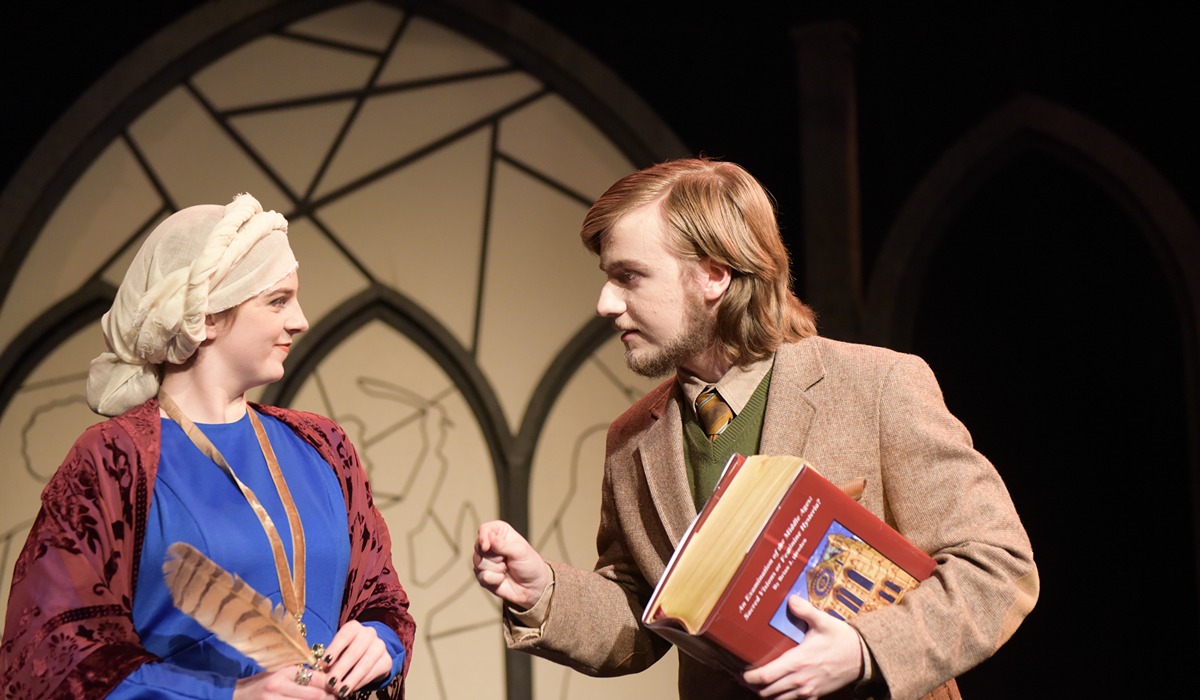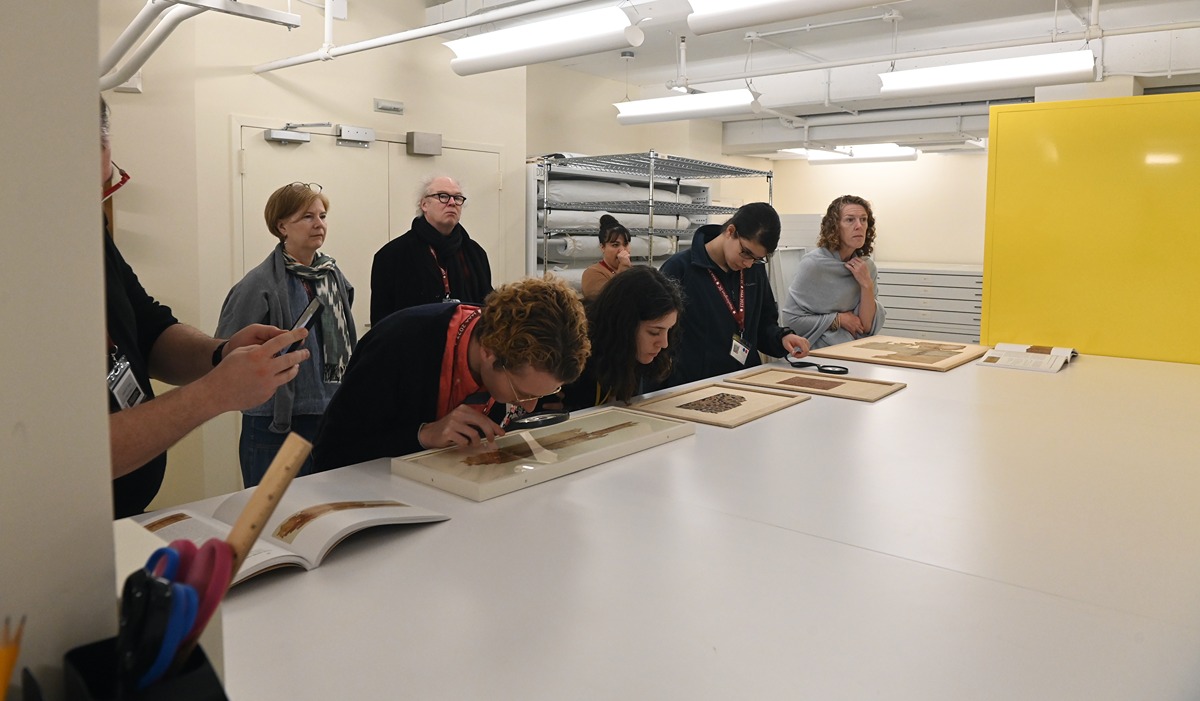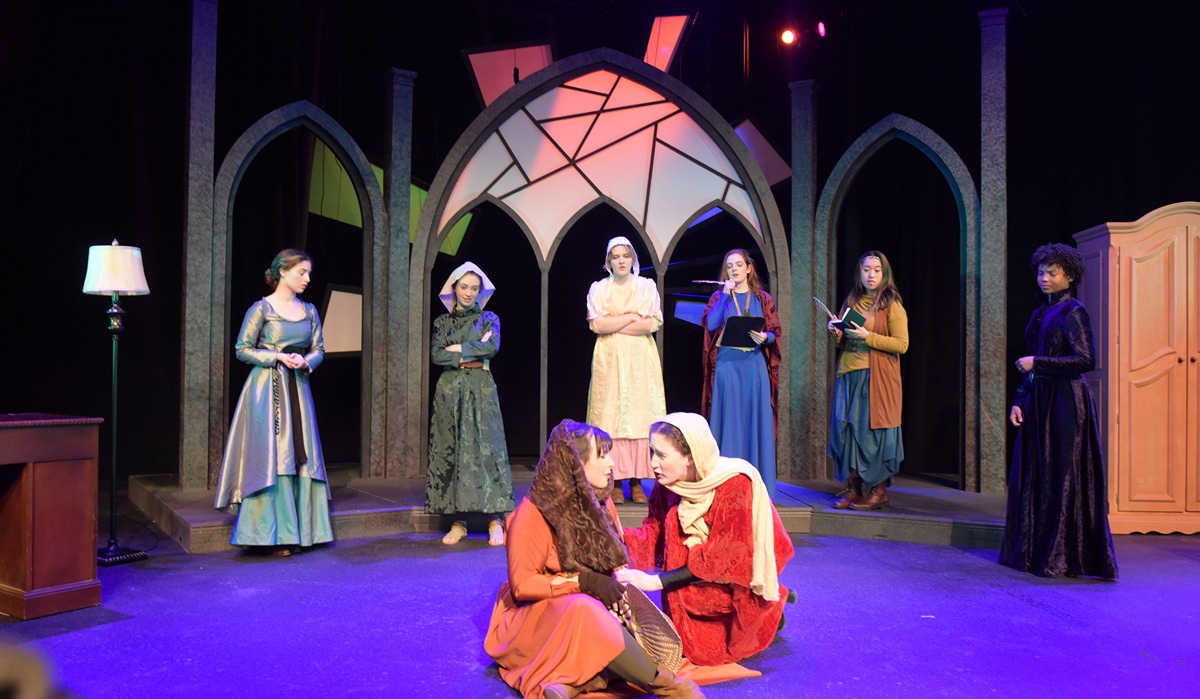Giving medieval women the fanfare they deserve was the impetus for Victoria Estes, M.A. 2022 to work as a researcher to Rejoicing in Broken Pieces, an original play that recently debuted at The Catholic University of America.
Estes studied dramaturgy at the nationally recognized Benjamin T. Rome School of Music, Drama, and Art, which she said trained her to take deep dives into history to help “build a world” before an audience.
“It’s amazing,” said Estes after another sold-out performance at Harke Theatre during the show’s Feb. 23-26 initial run. “I get to specialize in what I love,” said Estes, who said she especially enjoys the experience of joining a “director and playwright all in the same room...and developing a story from the ground up.”
Rejoicing in Broken Pieces features nine remarkable saints, mystics, and pioneers frozen in time. At the beginning of the play, an arrogant academic reads from his own book questioning whether prominent medieval women were visionaries or suffered from “feminine hysteria.” (Estes made the prop for the massive tome, book cover and all). His lecture (and his ego) is shattered after the silent images in the stained glass windows come to life to bring voice to their remarkable lives on their own terms.

“We have a sense that these women can break out of the glass and tell their stories. And to tell their stories in their own words, not mediated by a man,” said Playwright Allyson Currin at a panel discussion during the annual Medieval Academy of America (MAA) meeting. Held this year in late February in Washington, D.C., it is the largest gathering in the field and the occasion for the commissioning of the play by the University.
“The challenge of that is that every character has their moment and you have to distill them to an essence in a way,” said director Eleanor Holdridge. The panelists praised Estes’ research into the lives of each historical heroine to help shape the script.
Medieval scholar Jennifer Davis, associate professor of history, said in a separate interview that the women-led production and MAA meeting that she played a key role in organizing, with the support of the University community, speaks volumes about the campus as a center for medieval studies.

“I think it's a testimony to the strength of our program in medieval studies,” noting that the most recent MAA president Maureen Miller is an alumna, M.A. 1983. “We have very rich faculty resources, we have important collections…and the meeting was an opportunity to highlight those strengths and showcase them within the greater D.C. area as a center for medieval studies.”
A behind-the- scenes tour exclusive for MAA attendees showed off the Dumbarton Oaks collections, a leading research institute in Washington, D.C.. Other excursions included special tours of the National Gallery and the Library of Congress.
Estes took advantage of the research opportunities at the University during her time as a student. As part of her graduate studies, she conducted research on the first female playwright Hrotsvitha, or “strong voice,” which was a major reason she was brought on board the team to develop the play. She explained that Hrotsvitha’s long lost work was rediscovered by Conrad Celtes, a German scholar from the turn of the 16th century, who extensively edited the manuscript.
“Her manuscript has his notes and smudges of ink…As a history buff, that got under my skin,” said Estes, who took joy in incorporating Hrotsvitha’s Dulcitius into Broken Pieces. She researched ancient coronation ceremonies and provided the actors with “basic information about these women to start the characterization process.”
Medieval scholar Jennifer Paxton, clinical associate professor of history, co-taught an undergraduate course this fall focused on Broken Pieces as it was being developed. She said that the play is “a call to arms for us because we have had the privilege of seeing the play and seeing behind the glass in a sense. So we now have to be on the alert for places where their voices have been edited and changed or silenced.”
Paxton said as part of the course they learned about how stained glass is produced from Associate Professor of Chemistry Katherine Havanki. They also took advantage of the University’s Washington, D.C., location with tours of the stained glass at the Washington National Cathedral and the Basilica of the National Shrine of the Immaculate Conception.
After breaking barriers in the medieval world, Estes’ next challenge is taking on another realm: a parody of Steven King’s scary stories titled Shining in Misery.
“A big part of my job now is watching Stanley Kubrick movies,” said Estes with a laugh. You never know what type of drama you will get in the life of a dramaturgist!"



